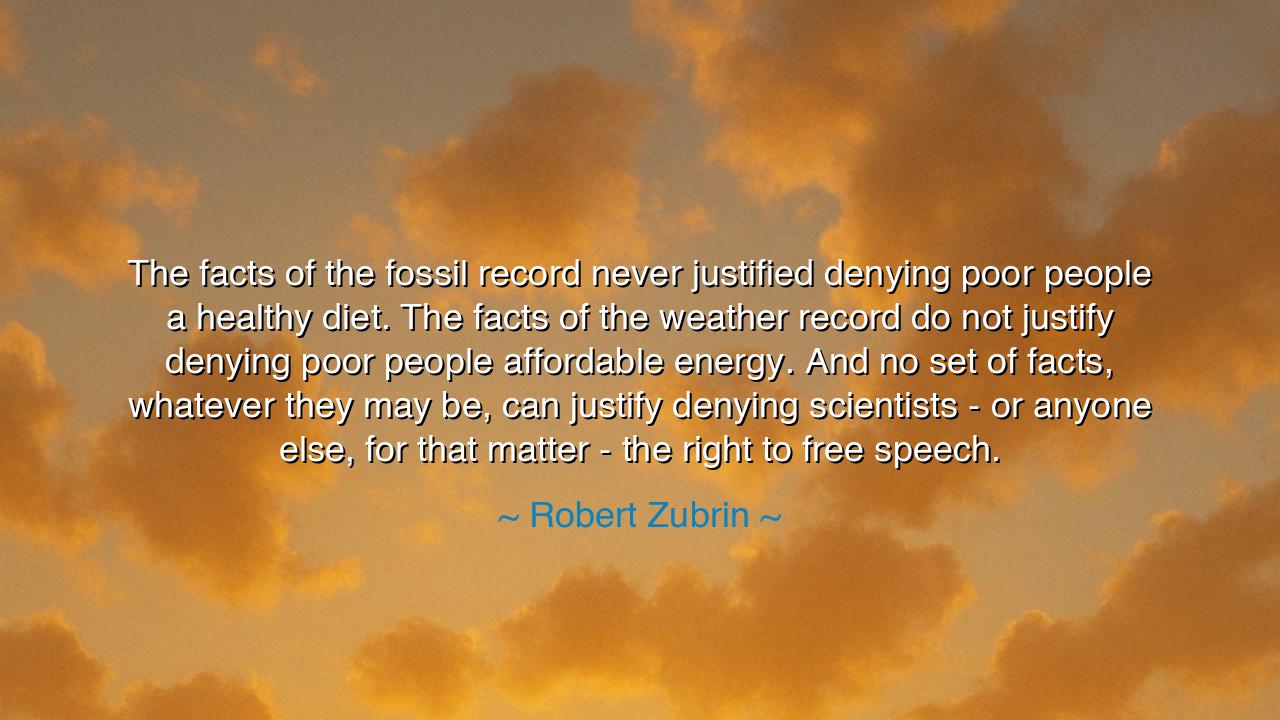
The facts of the fossil record never justified denying poor
The facts of the fossil record never justified denying poor people a healthy diet. The facts of the weather record do not justify denying poor people affordable energy. And no set of facts, whatever they may be, can justify denying scientists - or anyone else, for that matter - the right to free speech.






In the words of Robert Zubrin, “The facts of the fossil record never justified denying poor people a healthy diet. The facts of the weather record do not justify denying poor people affordable energy. And no set of facts, whatever they may be, can justify denying scientists – or anyone else, for that matter – the right to free speech.” These words are more than a defense of freedom—they are a declaration of moral balance, a call to wisdom in the face of knowledge. For Zubrin speaks not against science, but against the misuse of truth, when facts are wielded as weapons to bind rather than to liberate. His message is both timeless and urgent: that truth, divorced from compassion and freedom, ceases to be wisdom at all.
The ancients, too, wrestled with this tension. They knew that knowledge without virtue is a dangerous master. In the great libraries of Alexandria, philosophers debated not only the nature of the cosmos, but the proper use of knowledge among men. For they understood that every discovery carries a moral burden: the power to heal or to harm, to feed or to deprive. Robert Zubrin’s words rise from that same lineage of thought. He warns that the facts of nature—whether they concern the fossil record or the climate—must never become excuses for cruelty, neglect, or tyranny. Facts illuminate; they do not command. It is the heart that must decide how to act upon them.
Consider the tale of Galileo Galilei, who gazed at the heavens and saw truths that threatened the comfortable illusions of his age. The Church silenced him, not because his observations of the stars were false, but because they challenged authority. In that moment, free speech became not a privilege, but the guardian of progress. Galileo’s courage reminds us that when speech is shackled, truth itself is diminished. And so Zubrin’s words echo this ancient struggle: that no “set of facts,” no claim of righteousness or fear of error, can justify the silencing of inquiry. For without the freedom to question, civilization itself falls into darkness.
But Zubrin’s quote also speaks to justice among men. When he says that “the facts of the fossil record never justified denying poor people a healthy diet,” he confronts the arrogance that sometimes arises when knowledge is used to dictate morality. The fossil record tells us of evolution, extinction, and survival—but it does not tell us to let the hungry starve in the name of purity. Likewise, “the facts of the weather record” may reveal the storms of the earth, but they cannot command us to deny warmth and light to those who live in poverty. To wield science as justification for suffering is to betray the very purpose of understanding. The ancients would call this hubris—the pride that places intellect above compassion.
We are reminded, too, of Prometheus, the titan who stole fire from the gods and gave it to mankind. He was punished not for ignorance, but for compassion. Fire—symbol of knowledge and energy—was deemed too powerful for mortals. Yet it is fire that built civilization, that warmed our homes, that gave rise to light itself. Zubrin’s words echo this myth in a modern tongue: that to deny energy, to restrict the tools of progress in the name of fear, is to repeat the gods’ cruelty toward Prometheus. Knowledge must serve humanity, not dominate it.
In the rhythm of his thought runs a deeper current—a defense of human dignity. For when truth becomes ideology, and compassion yields to control, freedom perishes. The ancients taught that the measure of a wise ruler was not the knowledge he possessed, but how he used it to lift the weak and protect the free. Zubrin’s warning is thus both moral and eternal: no truth is noble when it becomes an instrument of oppression. Knowledge must walk hand in hand with mercy, and liberty must remain the breath of science.
So let this be the teaching carried forward: seek knowledge, but never forget wisdom; speak truth, but never silence others; pursue progress, but never forsake compassion. The facts of the world are vast, cold, and impartial—but the heart of man gives them meaning. To deny the poor their sustenance, to deny the world its light, or to deny the mind its freedom, is to betray both reason and humanity. Remember always: knowledge is a lamp, not a chain. Guard your freedom to think, to speak, and to question, for in that freedom lies not only truth—but the enduring strength of the human spirit.






AAdministratorAdministrator
Welcome, honored guests. Please leave a comment, we will respond soon